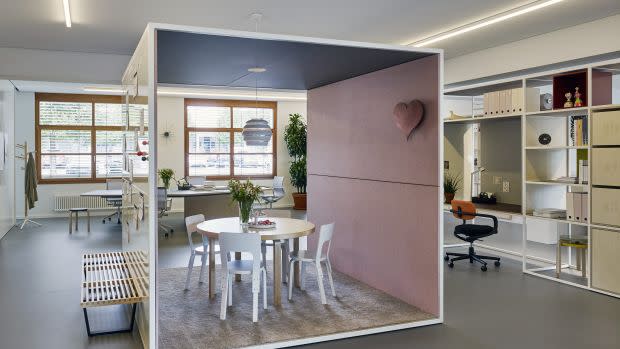The existential toll of missing the office
- Oops!Something went wrong.Please try again later.

Who am I? Why am I here?
The proven viability of work-from-home arrangements during Covid-19 has made many companies around the world question the utility of having a physical headquarters. But before we order a gravestone to communal places of work, experts caution that an office fulfills a deeper purpose in our lives.
In a thought-provoking discussion moderated by Vitra Design Museum director Mateo Kreis at the Swiss company’s recent design summit, organizational behavior expert Gianpiero Petriglieri, psychotherapist Esther Perel, and architect Gary Turnbull delved into the ramifications of eradicating the physical office. They advise that this period of forced remote work is a moment for self-examination. Do we see the office as a paradise of productivity, a prison of corporate bureaucracy, or somewhere in between?
“The office has never been about being productive, argues Petriglieri. “It’s about coming together and learning about yourself and others.”
Snapping out of the routine of going to the office helps us have a clearer perspective about the places where we engage in our jobs, he adds. “Who will miss the office if it disappears?…[If it’s a] place of comfort for you, maybe of liberation, a place of the imagination, then you probably will miss it. I miss it,” says Petriglieri, who recently wrote a love letter to offices for the Harvard Business Review. “If it was a prison, a place of suffering, of abuse, of neglect, of feeling invisible, then you probably will not miss it. Then in fact, you might feel liberated by the disappearing of the office.”

Gary Turnbull, Gianpiero Petriglieri, Mateo Kreis and Esther Perel at the Vitra Summit
Petriglieri talks about his office at INSEAD in Paris as a box that contained his professional duties and aspirations. Forced to work at home, next to his personal affairs, has made work feel needlessly monumental. “It’s very stressful and so you need to recreate those buffers, those boundaries,” he explains. The communication barriers can be soul-crushing too. “I think Zoom is an incredible metaphor for precarious relationships. Leave the meeting and, poof, you’re gone. Our eyes register presence, our bodies register absence,” Petriglieri says.
Perel adds that the stasis of being at home all the time can be overwhelming. “At this moment, we’re on the same chair where we are all sitting, we are the professional, we are the parent, we are the child, the friend, the lover, the colleague, the boss, the teacher—everything in the same spot and all these roles have merged together,” she explains. Without the physical separation the office afforded, she says it’s important to design new activities to demarcate the day. This can simply involve talking a breather after Zoom call or even changing clothes during the day.
Turnbull, meanwhile, observes that commuting to a central place of work, as arduous it may have been, offered workers a time collect themselves. “The traditional way of going to the office was reset time. You could either prepare for the day or you could unwind from the office when you came home,” he says. “Now there seems to be no pause. It’s very difficult to switch off, so I think everybody’s under quite a lot of pressure.”
Workplaces are “complex social ecosystems, just like any other places that humans inhabit,” and missing that social dimension of work is central to our angst, explains Perel, who hosts a podcast called How’s Work?
More than an amalgam of ergonomic furniture and meeting rooms, an office, for some of us, is a place that can fulfill our deepest longing. “What do people want from work today? Belonging, meaning, continuity, community,” Perel explains. “Basically, they’re trying to work like they’re trying to love—the things that traditional religion and community used to provide for them. These are existential needs. The office is about that.”
Sign up for the Quartz Daily Brief, our free daily newsletter with the world’s most important and interesting news.
More stories from Quartz:

